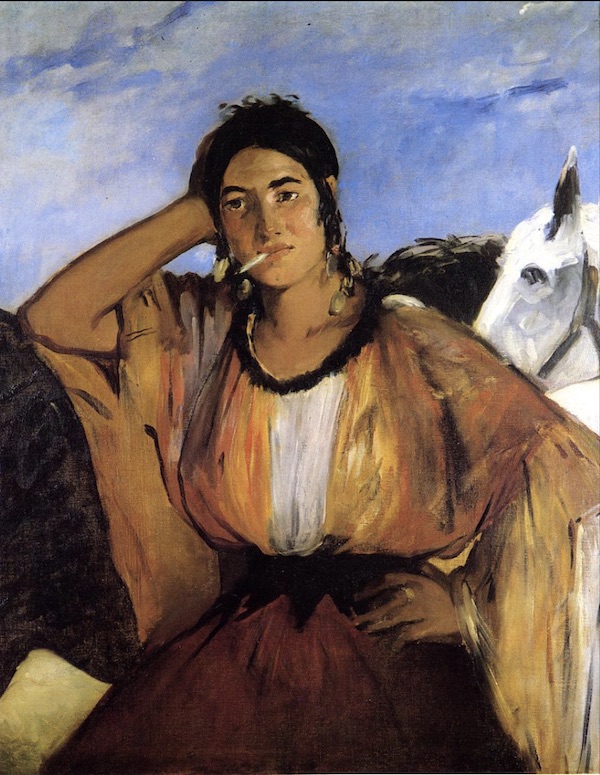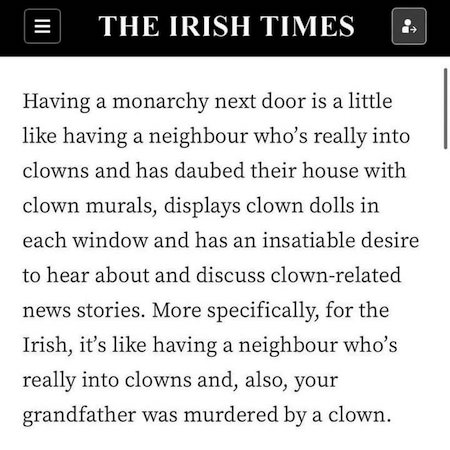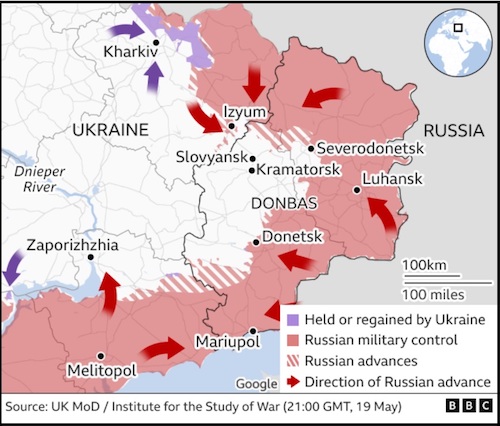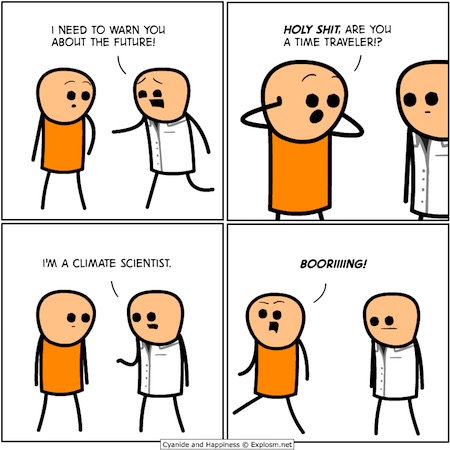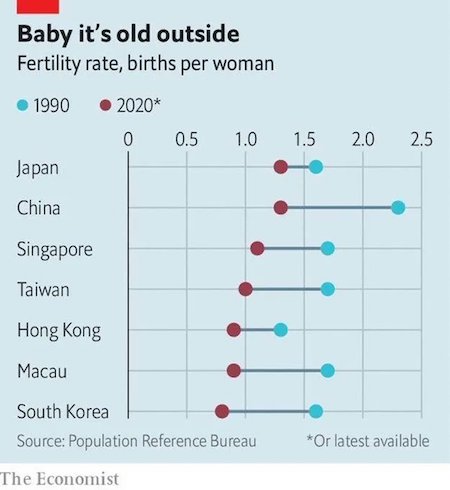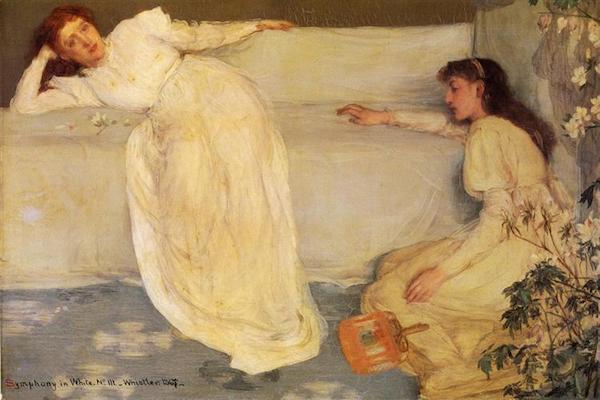
James McNeill Whistler Symphony in White, No. 3 1867



Lara Logan
.@LaraLogan is simply savage here.#RESISTpic.twitter.com/yq2Pa3toU5
— Maajid أبو عمّار (@MaajidNawaz) May 30, 2022

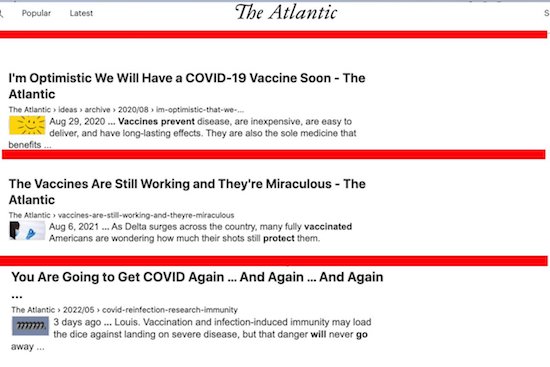

WHO Treaty
Dr. Robert Malone & Dr. Pierre Kory on The WHO Treaty:
“If this was to pass, he [Dr. Tedros] has authority to do surveillance within a nation’s state. This is going to be done entirely confidentially with no transparency. That’s what we’re up against.” – Dr. Robert Malone pic.twitter.com/VWWVCXYRDI— Covid Memo (@CovidMemo) May 22, 2022

“To prolong it by supplying more money and weapons is criminal and should be punished.”
• Ukraine Bits: Russian Artillery – Counter Attacks – New Missile Systems (MoA)
Former Lieutenant Colonel of the U.S. Army Daniel Davis has written some realistic pieces on Ukraine. His latest though are a bit of fantasy. He describes in three parts “How Ukraine Can Drive Russia Out”.First Ukraine would have to hold onto Donbas and with the help of raids and counterattacks unbalance the Russian forces. It would then perform a delaying retreat under fire to several new defense lines created in its rear. This delay action should allow for time to build a new force of 100,000 new troops in west Ukraine who would be equipped with a huge amount of new ‘western’ systems. It would take twelve to eighteen months to build and train that counterattack force.
Davis knows of course that each of those steps is completely unrealistic. His real advice is to negotiate an end to the war as soon as possible. But the writeup of what would really be necessary for the Ukraine to have at least a chance to win against Russia is helpful as it demonstrates the futility of such an effort. There is no way for the Ukraine to turn the situation around or to win the war. The Ukrainian government has to give up. To stop the dying and the extensive amount of damage the war causes it must end now. To prolong it by supplying more money and weapons is criminal and should be punished.
Media Is Far Too Late In Admitting Ukraine’s Severe War Losses
Media Is Far Too Late In Admitting Ukraine's Severe War Losses
Watch the whole show here: https://t.co/XZqpBrmB0s pic.twitter.com/YgDy6GTTf7
— Ron Paul (@RonPaul) May 30, 2022

Not as long as there are still Ukrainians alive.
• Biden Administration in No Rush to Help Ukraine Negotiate End to War (Jacobin)
“Russians believe the US calls the shots,” says Chas Freeman, longtime US diplomat under successive presidents and assistant secretary of defense for international security affairs under Bill Clinton. “Therefore, talking to those who take direction from the US is unlikely to yield anything useful.” “You’ve got the issue of whether Ukraine will join NATO, and the sanctions,” says John B. Quigley, an expert in international law who led talks on the status of the Donbas and Crimea after the Cold War. “So I think the major powers do need to be involved.” But if the diplomatic line between Kiev and Moscow has gone cold in recent weeks, the one between Moscow and Washington is buried under an ice shelf.
While the United States and Russia have engaged in a prisoner swap and seen contacts between military officials, secretary of state Tony Blinken — the top US diplomat — and his Russian counterpart haven’t spoken once since before the start of the war. US officials have justified this lack of engagement in a variety of ways, arguing that Putin isn’t serious about negotiating, and that whether or not to negotiate “are decisions for [Ukrainians] to make.” But it’s been harder to wave off as US involvement in the war has deepened. “The idea is that we don’t negotiate with him, the Ukrainians decide,” says Rajan Menon, director of the Grand Strategy program at Defense Priorities. “But we are deeply implicated in this war — we can’t pretend we aren’t.”
Washington has begun sending heavy weaponry that was considered too escalatory only weeks earlier, and has boasted of its role in helping Ukraine kill a series of Russian generals and sink the flagship of its Black Sea fleet. Multiple US officials have now openly described the conflict as a proxy war with Russia, while Steny Hoyer, the second-highest-ranking Democrat in the House, declared that “we’re at war.” The feeling is mutual over on the Russian side. The stakes of not reaching a settlement are high. For the world, there’s the hovering specter of nuclear escalation that could quickly envelop all of Europe and North America in the devastation, along with the government-toppling economic instability being fueled by the war’s resulting supply shocks. For Ukrainians, it means more death, destruction, and economic chaos, with the World Bank predicting the invasion will shrink its economy 45 percent this year.

We only kill Ukrainians.
• US Won’t Send Ukraine Rocket Systems That Strike Into Russia (JTN)
President Joe Biden told reporters at the White House on Monday that the U.S. won’t send Ukraine rocket systems that could possibly reach Russia. It was previously reported that the Biden administration was considering sending such systems to the Ukrainian government during the ongoing invasion of its country by Russia. “We are not going to send to Ukraine rocket systems that strike into Russia,” Biden said on Monday. He also addressed potential gun control measures that could be put into place after the mass shooting at an elementary school in Texas. Biden was asked if there’s an area he sees agreement on with Republicans in terms of gun policy, such as a potential red flag bill.
“That’s hard to say because I have not been negotiating with any of the Republicans yet,” he said. In terms of a possible ban on semi-automatic weapons, Biden said, “The Constitution, the Second Amendment, was never absolute,” according to a White House press pool report. Biden also reportedly told the press that “there’s simply no rational basis for it in terms of self-protection, hunting.”

“..the Bundeswehr currently only has 50 modern tanks..”
• Germany Is Failing Ukraine (Hoyer)
A giant step for German and European security,’ is how Chancellor Olaf Scholz described his government’s €100 billion cash injection for the country’s depleted military. But while Germany’s newfound commitment to its own defence is welcome, its commitment to Ukraine’s is still questionable at best. Over the weekend, the German newspaper Die Welt reported that it had seen documents showing that Berlin had reduced military support for Ukraine to ‘a minimum’. According to inside sources, only two German weapon deliveries have reached Ukraine since the end of March. Both contained light equipment such as mines, hand grenades and spare parts for machine guns. The last delivery of anti-tank and anti-aircraft weaponry dates back to 25 March.
This reality is strangely at odds with Scholz’s combative rhetoric. Last week, at the World Economic Forum in Davos, the Chancellor condemned Putin’s ‘imperialism’. He said that the invasion had led to a fundamental change in German foreign policy: ‘For the first time ever, Germany is delivering weapons into such a war zone, including heavy gear.’ He added: ‘Putin will only seriously engage in peace negotiations when he realises that he cannot break Ukraine’s defences.’ So why has Germany been so poor at shoring up those Ukrainian defences? The reluctance to support Kyiv persists out of a misguided sense of historical legacy. As the historian Timothy Snyder argued: ‘the confusion of responsibility and guilt has become a Russian weapon’. It’s clear that Germany could have delivered more weapons earlier, even if it might have taken longer than its better-funded American and British allies.
Others have argued that Berlin has now overcome its reluctance and wants to deliver but can’t because of its depleted military supplies. Look to the deal struck with Poland, these people arguer. Prime Minister Mateusz Morawiecki confirmed that his country had sent over 240 Soviet-era T-72 tanks to Ukraine and hoped, in return, that western allies might help replenish Poland’s stock. In return, Germany was asked to send a set of Leopard 2 tanks to its neighbour. Yet the Polish President Andrzej Duda claimed last week Germany had agreed to send the tanks but then broke its promise. Berlin responded with surprise and indignation at the accusations. Spokesman Steffen Hebestreit said the German government was ‘baffled’ by the allegations and said no promise had been made, adding that the Bundeswehr currently only has 50 modern tanks.

“It turned out that picturing Russia as a wild Cossack riding a bear, a ruthless Asian “enemy” at Europe’s border was more desirable than integration with Russia.”
• Why “Cancel” Russians? (Milacic)
There is a persistent belief in both Europe and the United States that the “Western” economies are the most developed around, just as the “Western” culture and democracy, with its culture of abolition and total tolerance, is the only correct and advanced system. Russia, which is a bridge connecting Europe with Asia since Tsar Peter, has apparently chosen the European path. With all its exotic image and totalitarian regimes that oppressed the Russian people, deep down, the latter considered themselves Europeans. Their jokes and humor are easily understood in both North America and in Europe, and the Russians’ values in life are in many ways similar to European ones. And still, they were not accepted into the European family.
During the 18th and 19th centuries Russia accepted and completely assimilated tens of thousands of Polish, Dutch, German settlers, but was never recognized in Europe as one of their own. It turned out that picturing Russia as a wild Cossack riding a bear, a ruthless Asian “enemy” at Europe’s border was more desirable than integration with Russia. The notion of the “Russian threat” has been exploited since the 18th century by politicians, from Louis XV to Barack Obama. After all, nothing brings small European countries closer together than the image of a common enemy. The Russians sincerely did not understand why they were not accepted into the European family. After the collapse of the Soviet Union, Moscow even asked to join NATO.
The only thing that politicians in Moscow asked their Western partners for was not to offend the Russian-speaking residents of the Baltic countries and Ukraine, who, in the wake of the Soviet collapse, had became second-class people there. Let us be honest, however. Russia was purposefully being nurtured as an enemy. The Russophobic policy of the Baltic republics led to a break with Russia and forced Moscow to urgently start building, due to logistical security concerns, new ports in the Baltic. Two color revolutions in Ukraine, orchestrated by Western “democracies” brought local nationalists to power and eventually sparking a conflict in Donbass, where 95 percent of people were not native speakers of the “state” Ukrainian language.
Even then, the Russians tried to demonstrate their friendliness to Europe. In the spring of 2021, when Italy’s medical system was paralyzed by the Covid-19 pandemic, the Russians sent there several planes with doctors and medicines, along with a team of military personnel from the chemical defense forces, who helped the Italians disinfect quarantine zones in hospitals. Following the November 2015 terrorist attacks in France, the Russian military, which had previously suffered from radical Islamists itself, wrote on the missiles, which they used against terrorist groups in Syria “For Paris.” Russia’s opposition-minded intellectuals sincerely believed that Russian liberals would be dear guests in Europe. It seems that until February 2022, pro-government circles in Russia sincerely believed that the West could force Kiev to start implementing the Minsk agreements on Donbass.

Speechless. How dare you publish this?
• Azov Battalion Drops Neo-nazi Symbol Exploited By Russian Propagandists (Times)
The Azov Battalion has removed a neo-Nazi symbol from its insignia that has helped perpetuate Russian propaganda about Ukraine being in the grip of far-right nationalism. At the unveiling of a new special forces unit in Kharkiv, patches handed to soldiers did not feature the wolfsangel, a medieval German symbol that was adopted by the Nazis and which has been used by the battalion since 2014. Instead, they featured a golden trident, the Ukrainian national symbol worn by other regiments. “On the same principles and ideological basis as the legendary Azov regiment, we form new divisions. Every day they become more numerous and professional,” Maksym Zhorin, an Azov commander, said at the ceremony on Sunday.
Created in 2014 as a paramilitary organisation to fight pro-Russian separatists in the eastern Donbas region, the Azov Battalion first attracted far-right volunteers harbouring anti-Muslim and anti-Jewish views. This background has been used by the Kremlin to justify its assertion that Ukraine needed “de-nazifying”. Now incorporated into the national guard, the regiment has attracted fighters from a diverse range of backgrounds. It has played a decisive role in key battles in Kyiv, Kharkiv and Mariupol as part of the nationwide resistance effort. In March, President Zelensky, who is Jewish, awarded the title of Hero of Ukraine to an Azov commander.
The Kremlin’s use of the Azov Battalion as a pretext for invasion is undermined by the presence of neo-Nazi divisions within its own ranks. Rusich, whose fighters have been photographed in Ukraine, is a mercenary group that uses in its insignia the valknut, an old Norse symbol appropriated by white supremacists.
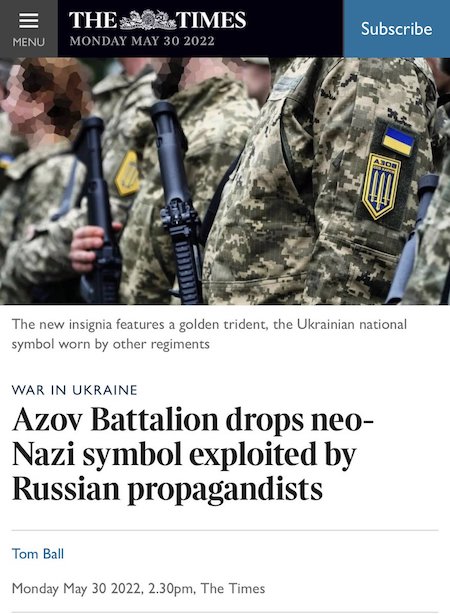

“..in case sanctions against Moscow are lifted..”
• Putin Ready To Facilitate Export Of Grains From Ukraine (AlJ)
President Vladimir Putin has said that Russia is ready to facilitate the unhindered export of grain from Ukrainian ports in coordination with Turkey, according to a Kremlin readout of talks with Turkish President Recep Tayyip Erdogan. Russia and Ukraine together account for 29 percent of global wheat exports, mainly via the Black Sea, and for 80 percent of global exports of sunflower oil. Ukraine is also a major corn exporter. In a call with Erdogan on Monday, Putin said that global food shortages were the result of “short-sighted” Western policies, adding that Russia was ready to export significant volumes of fertilisers and food in case sanctions against Moscow are lifted, according to the Kremlin readout of the talks.
“During the discussion of the situation in Ukraine, emphasis was placed on ensuring safe navigation in the Black and Azov seas and eliminating the mine threat in their waters,” the Kremlin said. “Vladimir Putin noted the readiness of the Russian side to facilitate the unhindered sea transit of goods in coordination with Turkish partners. This also applies to the export of grain from Ukrainian ports.” It was not immediately clear which Ukrainian ports Putin was speaking of. Ukraine’s main grain export ports include Chornomorsk, Mykolaiv, Odesa, Kherson and Yuzhny. Erdogan told Putin that peace needed to be established as soon as possible and that Turkey was ready to take on a role in an “observation mechanism” between Moscow, Kyiv and the United Nations, if an agreement is reached.

The increase in the cost of living has only begun.
• Gazprom Shuts Gas Deliveries to Dutch Trader GasTerra (WSJ)
Gazprom PJSC will stop supplying gas to Dutch wholesaler GasTerra from Tuesday due to the latter’s refusal to make payments in rubles. Gas trader GasTerra said Monday that it has decided not to comply with Gazprom’s payment requirements because doing so risks breaching European Union sanctions. The cessation means that around 2 billion cubic meters of contracted gas won’t be delivered between now and Oct. 1, when the deal was due to end, it said. “GasTerra has repeatedly urged Gazprom to respect the contractually agreed payment structure and supply obligations, but to no avail,” the trading company said.
GasTerra warned that it is impossible to predict whether the European market can absorb this loss of supply without serious consequences. In 2021 the EU imported 155 billion cubic meters of gas from Russia, around 40% of its total gas consumption, according to the International Energy Agency. GasTerra is 50%-owned by the Dutch government–partially through its gas company Energie Beheer Nederland B.V. The remaining shareholding is owned by Shell PLC and Exxon Mobil Corp., with each holding a 25% stake.

Shoot Slo-mo Foot.
• EU Leaders Agree On Partial Embargo On Russian Oil (AP)
European Union leaders reached a compromise Monday to impose a partial oil embargo on Russia at a summit focused on helping Ukraine with a long-delayed package of sanctions that was blocked by Hungary. The watered-down embargo covers only Russian oil brought in by sea, allowing a temporary exemption for imports delivered by pipeline. EU Council President Charles Michel said on Twitter the agreement covers more than two-thirds of oil imports from Russia, “cutting a huge source of financing for its war machine. Maximum pressure on Russia to end the war.” The EU had already imposed five previous rounds of sanctions on Russia over its war. It has targeted more than 1,000 people individually, including Russian President Vladimir Putin and top government officials as well as pro-Kremlin oligarchs, banks, the coal sector and more.
But the sixth package of measures announced May 4 had been held up by concerns over oil supplies. Hungarian Prime minister Viktor Orban had made clear he could support the new sanctions only if his country’s oil supply security was guaranteed. The landlocked country gets more than 60% of its oil from Russia and depends on crude that comes through the Soviet-era Druzhba pipeline. Ursula Von der Leyen, the head of the EU’s executive branch, had played down the chances of a breakthrough at the summit. But leaders reached a compromise after Ukrainian President Volodymyr Zelenskyy urged them to end “internal arguments that only prompt Russia to put more and more pressure on the whole of Europe.”
Von der Leyen said the punitive move will “effectively cut around 90% of oil imports from Russia to the EU by the end of the year.” The EU gets about 40% of its natural gas and 25% of its oil from Russia, and divisions over the issue exposed the limits of the 27-nation trading bloc’s ambitions.
The grain crisis in Finland followed the shutdown of Russian gas.
There is no bread in the shops of most Finnish cities. People say there is no gas in bakeries to make bread. pic.twitter.com/lAKv4fn2FV
— Spriteer (@spriteer_774400) May 30, 2022

“For the time being, Russian gas keeps flowing into Europe and the lights are still on in Europe, although it cannot be said for how long.”
• The Age of Exterminations VIII – How to Destroy Western Europe (Ugo Bardi)
In 1944, Henry Morgenthau Jr., Secretary of the Treasury of the United States, had proposed the plan that would take his name, the “Morgenthau Plan.” The plan called for the complete destruction of Germany’s industrial infrastructure and the transformation of Germany into a purely agricultural society at a nearly medieval technology level. As a consequence, Germany wouldn’t have been able to import food from abroad and that would have resulted in the death of tens of millions of Germans. The Morgenthau Plan was initially approved by President Roosevelt, and it was even publicly diffused in the press. Fortunately for the Germans, it was then abandoned by President Truman, but it remained active as a practical set of guidelines for the allied policies in Germany until 1948.
As a result, untold numbers of Germans died as the consequence of starvation. Some people speak of at least one million victims (or several million) of famine during the period from 1945 to 1948, but we’ll never know the exact number. As we all know, the Germans were far from being innocent in this worldwide extermination game. In addition to the Shoah and the extermination of other ethnic groups, including German citizens judged to be a burden for society, in 1942 the German government had developed the “Generalplan Ost” (General Plan for the East) that foresaw the extermination of tens of millions of Slavs in Eastern Europe. The survivors would be used as servants and laborers for the German “master race” (Herrenvolk).
It is impressive for us to remember how, less than a century ago, there were Western governments happily engaged in planning exterminations involving tens of millions of Europeans. Could these dark times return? It is said that civilization is just three hot meals away from barbarism, and we could rephrase this old saying as “society is just one defeat away from extermination.” Indeed, the events of the past few months saw Western Europe close to inflicting a terminal defeat on itself by abandoning its main source of energy: Russian oil and gas. Fortunately, it seems that, after all, Europe won’t commit economic suicide as it seemed to be intentioned to do. For the time being, Russian gas keeps flowing into Europe and the lights are still on in Europe, although it cannot be said for how long.

Why am I not surprised?
• Fauci’s Recent, $10M Monkeypox Grant (NP)
Anthony Fauci’s National Institutes of Health agency was funding research to identify treatments for monkeypox shortly before the virus began spreading in a global outbreak. Fauci’s agency, the National Institute of Allergy and Infectious Diseases (NIAID), has previously come under scrutiny for funding bat coronavirus research at the Wuhan Institute of Virology, which many public health experts and intelligence officials believe to be the source of COVID-19. NIAID has also funded research into potential cures for monkeypox, shortly before the viral disease began spreading in a global outbreak. The curious timing of the NIAID grant comes amidst pharmaceutical giants including Pfizer and Johson & Johnson making record-level profits due to the COVID-19 pandemic.
The grant supports a “randomized, placebo-controlled trial of the safety and efficacy of tecovirimat for the treatment of patients with monkeypox virus disease.” “The funding supports a clinical trial to identify effective treatments for monkeypox virus disease,” explains a summary of the research, which, despite beginning in September 2020, has not generated any publicly available studies, papers, or patents. “The similarity between monkeypox and the variola virus, coupled with concerns about the potential of the variola virus as a potential bioterrorism agent, have placed monkeypox treatments at the forefront of public health and scientific research agendas in many countries,” adds the grant summary.
The National Institutes of Health (NIH) grant database shows that $9,824,009 was sent to Leidos Biomedical Research, which partners with the NIH’s National Cancer Institute (NCI) to operate Frederick National Laboratory for Cancer Research, in 2021. The grant, which is set to conclude on September 27th, 2025, was distributed to Lori Dodd, who serves as a Mathematical Statistician in the Biostatistics Research Branch of the NIAID. Dodd was previously exposed for her involvement in the NIAID’s efforts to cover up the agency reportedly altering the endpoint in a trial testing the effects of remdesivir against COVID-19 to make it look more effective.

” They don’t have any way they can tackle this problem.”
• Almost 500,000 UK Small Businesses ‘At Risk Of Going Bust Within Weeks’ (G.)
Rising costs have created a “ticking timebomb” for UK small business owners, the chairman of the Federation of Small Businesses (FSB) has warned, with almost half a million firms at risk of going bust within weeks without a fresh wave of government support. While the FSB chairman, Martin McTague, applauded the chancellor Rishi Sunak’s latest support for consumers through the £15bn cost of living package announced last week, he said some of those recipients could lose their jobs unless the government rolled out targeted measures for their employers. “We don’t have any problem with the way the chancellor dealt with consumer needs,” McTague told BBC Radio 4’s Today programme. “But there is still a massive problem with small businesses.
“They are facing something like twice the rate of inflation for their production prices, and it’s a ticking timebomb. They have got literally weeks left before they run out of cash and that will mean hundreds of thousands of businesses, and lots of people losing their jobs.” McTague pointed to figures from the Office for National Statistics, which showed that 40%, or 2m, of the UK’s small businesses had less than three months’ worth of cash left to support their operations. Of those 2m, the FSB chairman said about 10% – or 200,000 – were in “serious trouble”, and that another 300,000 “have only got weeks left”. He said: “It is a very real possibility because … they don’t have the cash reserves. They don’t have any way they can tackle this problem.”






Julian Assange: ‘This generation is the last free generation’
Julian Assange: 'This generation is the last free generation'
Daily Mailhttps://t.co/eQ9OxdwoQp pic.twitter.com/oc77TUlyki— Wittgenstein (@backtolife_2022) May 30, 2022

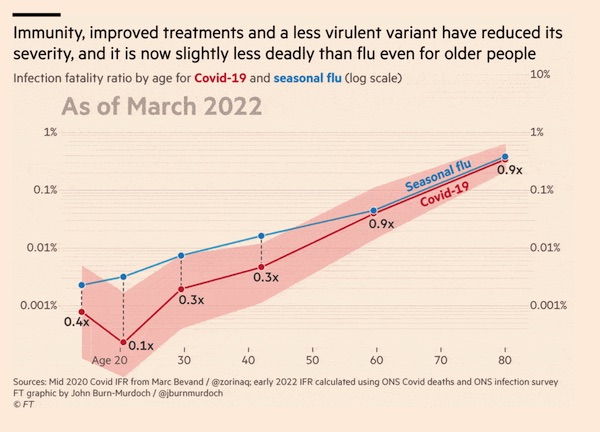

Support the Automatic Earth in virustime with Paypal, Bitcoin and Patreon.




